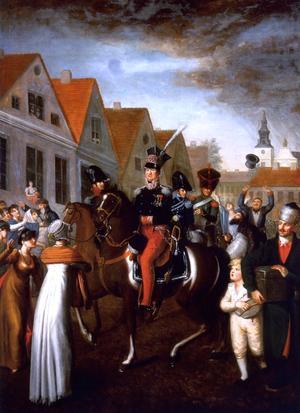Great Poland Uprising of 1806
| Greater Poland uprising of 1806 | |||||||
|---|---|---|---|---|---|---|---|
| Part of the War of the Fourth Coalition | |||||||
 Entrance of Jan Henryk Dąbrowski to Poznań painted by Jan Gładysz |
|||||||
|
|||||||
| Belligerents | |||||||
|
|
|
||||||
| Commanders and leaders | |||||||
|
|
|
||||||
| Strength | |||||||
| Unknown French soldiers ca. 23,000 Polish soldiers Unknown Pospolite ruszenie |
|||||||
Greater Poland uprising of 1806 was a military insurrection by Poles in Wielkopolska (Greater Poland) against the occupyingPrussian forces after the Partitions of the Polish-Lithuanian Commonwealth (1772–1795).
The uprising was organized by General Jan Henryk Dąbrowski to help advancing French forces under Napoleon I in liberating Poland from Prussian occupation. The Wielkopolska Uprising was a decisive factor that allowed the formation of the Duchy of Warsaw (1806) and the inclusion of Wielkopolska in the Duchy of Warsaw.
It was one of the three most successful uprisings in the history of Poland, in addition to the Greater Poland Uprising of 1918–1919 and Sejny Uprising in 1919.
While Kingdom of Prussia already possessed large Polish population in Upper Silesia, it gained additional Polish citizens during the partitions of Poland. From the beginnings of Prussian rule Poles were subject to a series of measures aimed against them and their culture; Polish language was abolished as official language and German introduced. Prussian ruler Frederick the Great who hated and despised Poles hoped to replace them with Germans Prussian officials who spread German language and culture often despised Poles, who were portrayed as 'backward Slavs'. Lands of Polish nobility were confiscated and given to German nobles. German colonists were settled
The War of the Fourth Coalition between Napoleonic France and Kingdom of Prussia gave hope to the Polish inhabitants of Greater Poland of recovering their independence and ending oppressive Prussian rule.
...
Wikipedia
